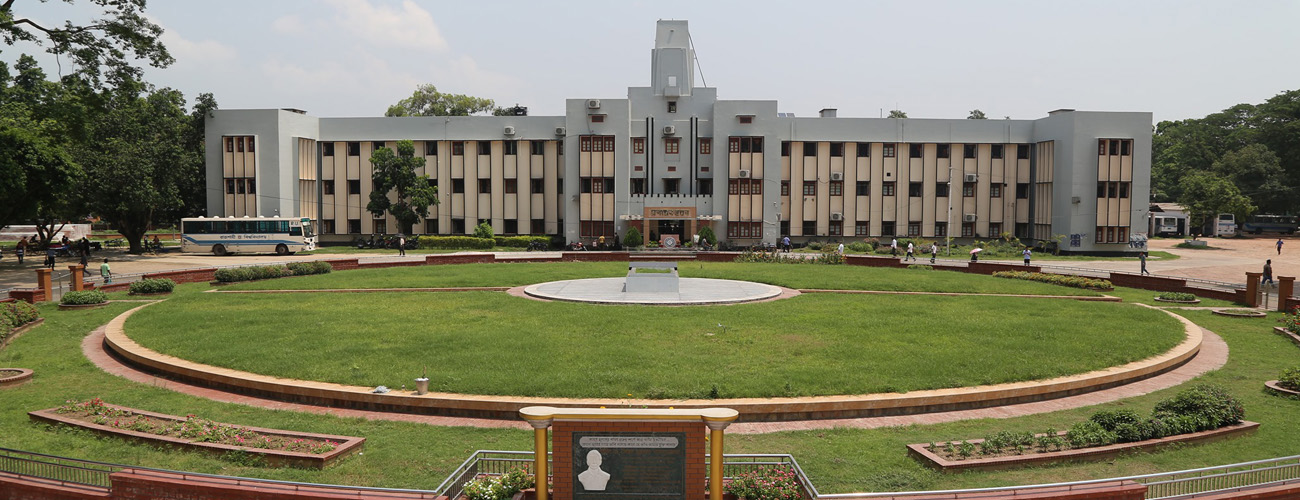About
The Department of Zoology had its origin in the Department of Botany in 1969-70. With the rapid advances in the field of animal science, it was felt necessary to extend it into an independent and full-fledged Department. Thus the Department of Zoology started functioning in the middle of 1972. Late Professor Dr. Mustafizur Rahman was appointed the first Headed. Since then the Department of has developed at a fast rate to its present state with a view to meeting the growing demand for trained personnel in the fields of classical as well as applied Zoology. Many changes have taken place over the last three decades. The academic staff members have increased from 4 in 1972 to its present strength of 28, comprising 14 Professors, 3 Associate Professors, 9 Assistant Professors and 2 Lecturers. The Department gratefully acknowledges the excellent contributions of its past academic staff members. Twenty two non-academic members, including a Deputy Museum Curator, an Assistant Registrar, 3 Section officers, one Specimen Collector, 9 Laboratory Attendants, 2 Field Gardeners, one Sweeper and one Cleaner provide important support to the teaching and research programmes. The present enrolment of students in undergraduate and postgraduate classes is over 500.
Facilities
The laboratories and offices of the Department are located in the Third Science Building of the Rajshahi University Campus. The Department offers good teaching and research facilities. At present, its major facilities include: 5 individual research laboratories, 7 research-cum teaching class rooms, 6 lecture cum-dissecting rooms, one large teaching rooms, a department library with a good number of books, journals and scientific literature, one well equipped Molecular Genetics Laboratory and one Computer room. The museum preserves over 850 specimens comprising about 45 genera of mammals, 40 each of birds and reptiles, 15 amphibians, 250 fishes, 50 arthropods and over 90 genera of other invertebrates. Several research fields are maintained for growing mulberry leaves and other plants required for culturing silkworms and lac insects. In addition, 16 mini ponds of about 2 hectares, one large & two gene tanks, and an aqua lab are also available for fisheries and limnological research.
Teaching Programme
With due aims at keeping the students abreast of advances in zoological sciences, the department offers both undergraduate (B.Sc. Honours) and postgraduate (M.Sc.) programmes. The undergraduates are enrolled for a 4-year integrated courses shared with the departments of Botany and Biochemistry. The B. Sc. Honours course covers the traditional as well as modern aspects of Zoology. These include: nonchordata and chordate structures & functions: morphology & morphometrics; comparative anatomy & evolutionary trends; cytology, histology & cytogenetics; genetics, animal breeding & developmental biology; evolution; paleontology; ecology; ethology; zoogeography; wildlife; environmental and health biology; human physiology; molecular biology; genetic engineering & biotechnology; systematics & biodiversity; economic zoology; parasitology and nematology; animal for farming and industry and animal ethics; biometry, research methodology & information technology; and microbiology & immunology.
Candidates securing B.Sc. Honours Degree in Zoology can enroll themselves for a one-year M.Sc. programme. On top of 3 core courses, an M. Sc. Student has to choose one of the 7 specialized subjects each having 3 courses, and he/she has to carry out an independent research topic culminating in a dissertation either an M.Sc. project of 50 marks or an M.S. thesis of 200 marks.
Research Programme
Apart from the M.Sc. programme, the department has varied and exciting programmes for graduates who are keen on pursuing postgraduate research leading to the degrees of Master of Philosophy (M.Phil.) or Doctor of Philosophy (Ph.D.) in Zoology. Seven areas of research currently pursued in the Department include Animal Genetics & Breeding, Cell Biology, Crop Protection & Toxicology, Ecology, Entomology; Fisheries, and Sericulture. The number of postgraduate research students has steadily increased over the years. Till now the department has produced some 12 M.Phils and 23 Ph.Ds while a good number of students are working for achieving similar degrees. Many of the ex-students have found careers in academic and research organizations, while other have already secured important positions in the public and private sectors of the country. The exchange of ideas between staff and students is encouraged through seminars where research findings are presented and discussed. In addition, the department publishes annually a journal called University Journal of Zoology, Rajshahi University, and a magazine in Bangla Probal (=Coral), funded by a grant from the Ministry of Science and Technology, Government of the People’s Republic of Bangladesh.
Apart from its own resources, the department undertakes research programmes in collaboration with other research institutions at home and abroad. Researchers from the Institute of Biological Sciences (IBSc), University of Rajshahi, Bangladesh Council for Science and Industrial Research (BCSIR) Laboratories and Bangladesh Sericulture Research & Training Institute (BSRTI), Rajshahi and from other Universities of the country pursue their postgraduate studies leading to M.Phil. or Ph.D. at the Department. An academic link-programme was in operation during 1988-1998 between this Department and the Department of Agricultural and Environmental Science, University of Newcastle upon Tyne, UK. This collaborative programme has provided ample opportunities for research, training and higher degrees to a considerable number of staff members of the Department.
Research and teaching activities are further strengthened by the financial support in the form of Research Grants providing by various funding agencies to the academics members of this department. A few of such recent grants were provided by the University of Rajshahi, BARC, the University Grant Commission, The Ministry of Science and Technology, The Third World academy of Sciences and International Atomic Energy Agency, Austria.
Social Life
A Society named Pranibidya Samity (Zoological Society) plays an active role in the social life of the Department. From time to time it offers opportunities for staff and students to interact outside their demanding work schedule.

